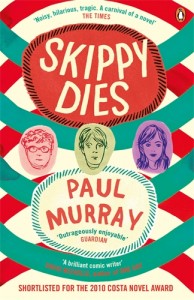 When the book arrived in the mail for my upcoming book club with a thunk, I thought, “there’s no way I can make it through 650+ pages before Saturday.” And then, magically, I did. And then, no so magically, I didn’t even get to go to book club because the RRBB was terrifically sick (104 fever, oh my!), and he basically used me as a couch from Thursday to Sunday, which was one of the hardest parenting weekends I’d had in a long time.
When the book arrived in the mail for my upcoming book club with a thunk, I thought, “there’s no way I can make it through 650+ pages before Saturday.” And then, magically, I did. And then, no so magically, I didn’t even get to go to book club because the RRBB was terrifically sick (104 fever, oh my!), and he basically used me as a couch from Thursday to Sunday, which was one of the hardest parenting weekends I’d had in a long time.
Annywaay, Skippy. Oh, the poor soul, so troubled, so riddled with angst, so deliciously in love with an unworthy girl. And then, it happens, he dies and the whole world that he leaves behind can’t seem to cope with the loss. Paul Murray’s Skippy Dies would have made for excellent book club discussion had I been able to participate. And, from the sounds of things, it did. One would imagine that many threads of a 600+ page novel would get lost, but Murray manages to keep a handle on the sprawling story for the most part. Sure, there were parts that I would have excised, but, on the whole, the book’s utterly readable and incredibly well-paced from beginning to end.
Murray smartly sets up the book with the scene where Skippy dies, close at hand is his best friend and roommate, Ruprecht, and they’re in the midst of a donut eating contest when it happens. The novel then spends the rest of time filling in the gaps, why Skippy dies, what his life was like before it happened, and how his life and death impacted those around him. Skippy is the sun, the centre of the universe in this imagined world, and everything eventually comes back to him.
Murray has an uncanny ability to write young adolescent male characters. He has an ear for their dialogue so it just hums through the novel. Unfortunately, as I’m sure my book club pointed out, the same can’t be said for his female characters. They’re terrifically one-dimensional, amazingly Mean Girl-esque without the Tina Fey undercurrent of honesty, and they seem to be unable to define themselves outside of the boys and/or men they are pushing and then pulling away. A cliched romance between a terrifically “bad” boy and the girl Skippy loves, Lori, also seemed a bit forced, but what do I know — I was just once a teenage girl.
Regardless, so much of this novel is sad, sad, sad, that it’s almost cathartic to read. I caught myself welling up so often, as Howard’s life collapses around him, as Skippy endures his terrifically difficult home situation, as Carl, the aforementioned bad-boy/bully, puts up with extremely adolescent parents, as Lori makes yet another utterly terrible decision. And then, when Skippy does die, the aftermath just about tears your heart out, the characters feel the loss so completely that for many many moments in this book the mother in me wanted to reach into the words and hold these boys tight, tight, tight to my chest and tell them everything will be okay.
Last night, we were watching something on television, I don’t know what, and my RRHB remarked that having a baby has forever made him a big old softie. For me, it’s awakened emotions that run so close to the edge that it barely takes a commercial to set them off. It was hard reading this book while my own RRBB was so ill, it was hard to imagine him being a young boy, having to contend with obnoxious girls, bullies, the breadth of modern life, the horrors of a boarding school, and the pressures of keeping secrets. So much happens to Skippy that if I didn’t have an equally difficult and tumultuous adolescence, I’d have found it hard to believe because that’s really the heart of this book — that life has no balance, it has no score card, that sometimes horrible, horrible, horrible things happen to the best of people, and figuring out how to cope with them isn’t always as easy as acing a test or winning a swimming meet.